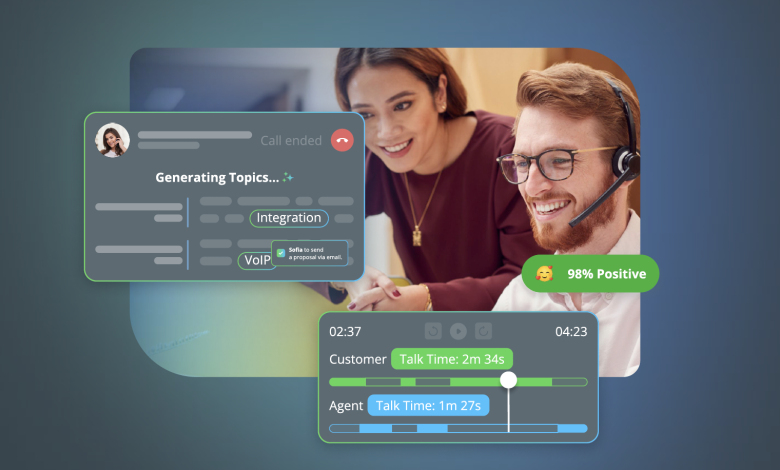
Artificial intelligence is the driving force behind the most significant transformation in business communications since the advent of the internet. As we navigate through 2025, the statistics paint a picture: 84% of telecommunications companies report revenue growth after AI adoption, while 95% of customer interactions are predicted to be handled by AI by the end of 2025. This isn’t just technological evolution; it’s a fundamental reimagining of how businesses operate, serve customers, and create value.
Revolutionizing Customer Experience: From Reactive to Predictive
The impact of AI on customer service and sales interactions represents perhaps the most visible transformation in business communications. 56% of business owners now use AI for customer service tasks, with AI-powered solutions delivering three times faster response times than traditional human-only approaches.
The sophistication of modern AI customer service goes far beyond simple chatbots. Today’s systems use natural language processing to understand intent, perform real-time sentiment analysis, and adapt responses based on historical context and emotional indicators. 75% of customer inquiries can now be resolved by AI tools without human intervention, while 80% of customers who have interacted with AI-powered customer service report positive experiences.
This transformation is driving measurable business results. Organizations implementing AI in customer service see 17% higher customer satisfaction scores and 37% reduction in first response times. The financial impact is equally compelling, with AI chatbots reducing customer service costs by 30% while simultaneously improving service quality and availability.
The evolution toward predictive customer service represents the next frontier. AI systems now analyze patterns in customer behavior, usage data, and interaction history to anticipate needs before customers even realize them. This proactive approach is transforming sales processes, with AI identifying upselling opportunities, predicting churn risk, and enabling personalized outreach that feels genuinely helpful rather than intrusive.
Enterprise Transformation: Beyond Cost Savings to Revenue Generation
While early AI implementations focused primarily on cost reduction and operations, 2025 marks a decisive shift toward revenue generation and business growth. Companies report that AI has helped boost their revenue by 10%, with mature AI adopters seeing 3x higher growth in revenue per employee than less exposed industries.
The transformation extends across all business functions. In network operations, AI enables self-organizing networks that automatically adapt to changing conditions, reducing human intervention while improving performance and reliability. Customer experience teams leverage AI for hyper-personalized interactions that analyze vast datasets to predict preferences and tailor communications in real-time.
For enterprise communications specifically, AI is enabling new business models and service offerings. GenAI capabilities are helping create dynamic pricing models, tailored marketing campaigns, and value-added services that generate new revenue streams while improving customer satisfaction. The ability to process and act on large volumes of customer data in real-time has become a key competitive advantage.
Small Business Empowerment: Leveling the Playing Field
Perhaps nowhere is AI’s democratizing effect more pronounced than in small business communications. Technologies that once required massive IT investments and specialized expertise are now accessible through cloud-based platforms like NUACOM that can be implemented in minutes rather than months.
Small businesses using AI report saving an average of 5.4% of their weekly hours, equivalent to significant cost savings and improved work-life balance for entrepreneurs and small teams. AI-powered tools handle routine tasks like appointment scheduling, email categorization, and basic customer inquiries, freeing human resources for strategic activities that drive growth.
The impact on customer engagement is particularly significant. Small businesses can now offer 24/7 customer support through AI-powered chatbots, compete with larger companies on response times, and provide personalized experiences that were previously impossible with limited staff. This levels the playing field, enabling small businesses to deliver enterprise-quality customer experiences while maintaining their personal touch and agility advantages.
The Future Landscape: Intelligent Integration and Human-AI Collaboration
Looking ahead, the future of AI in business communications is characterized by increasingly sophisticated integration and collaboration between human intelligence and artificial intelligence. By end 2025, 25% of enterprises using generative AI will deploy AI agents, with adoption rates expected to reach 50% among AI-enabled enterprises by 2028.
The evolution toward “agentic AI” represents a fundamental shift from reactive tools to proactive systems that can reason, plan, and execute complex tasks independently. These AI agents will handle end-to-end customer journeys, from initial inquiry through resolution and follow-up, while seamlessly escalating to human agents when empathy, creativity, or complex problem-solving is required.
Zero-touch operations are emerging as a realistic goal for many business processes. AI systems will self-monitor, self-heal, and continuously optimize performance with minimal human intervention. This doesn’t eliminate human roles but elevates them, with workers focusing on strategy, relationship building, and complex problem-solving while AI handles routine operations.
The integration of AI with emerging technologies like 5G networks, IoT devices, and edge computing will create new possibilities for real-time, context-aware communications. Businesses will anticipate customer needs, optimize resource allocation, and deliver experiences that feel increasingly intuitive and natural.
Navigating Challenges and Maximizing Opportunities
Despite the tremendous potential, successful AI implementation requires thoughtful strategy and execution. 95% of organizations see no measurable return on their AI investment when implementation lacks focus and strategic alignment. The key to success lies in identifying specific use cases where AI can deliver measurable value, rather than implementing technology for its own sake.
Data quality and governance emerge as critical success factors. AI systems are only as effective as the data they’re trained on, making comprehensive data strategies essential for realizing AI’s full potential. Organizations must balance AI’s efficiency gains with robust privacy protections and ethical considerations to maintain customer trust.
The human element remains crucial. While AI automates routine tasks and provides intelligent insights, human creativity, empathy, and strategic thinking become more valuable than ever. The most successful organizations are those that view AI as amplifying human capabilities rather than replacing them.
The Imperative for Action
The transformation of business communications through AI is not a future possibility – it’s happening now, at an accelerating pace. Organizations that embrace this change strategically position themselves for sustainable competitive advantage, while those that delay risk falling behind in an increasingly AI-driven marketplace.
The evidence is clear: AI is driving measurable improvements in productivity, customer satisfaction, and business growth across organizations of all sizes. From small businesses gaining enterprise-level capabilities to global corporations reimagining their operations, AI is democratizing access to intelligent systems while creating new possibilities for human-AI collaboration.
Success in this AI-driven future requires more than just adopting technology. It demands a strategic approach that aligns AI capabilities with business objectives, invests in data quality and governance, and maintains focus on the human relationships that remain at the heart of successful businesses.
As we move deeper into 2025 and beyond, the question is no longer whether to adopt AI in business communications, but how quickly and effectively organizations can integrate these capabilities to serve customers better, empower employees, and drive sustainable growth. The future belongs to those who act with both urgency and wisdom, embracing AI’s transformative potential while never losing sight of the human connections that make business meaningful.




